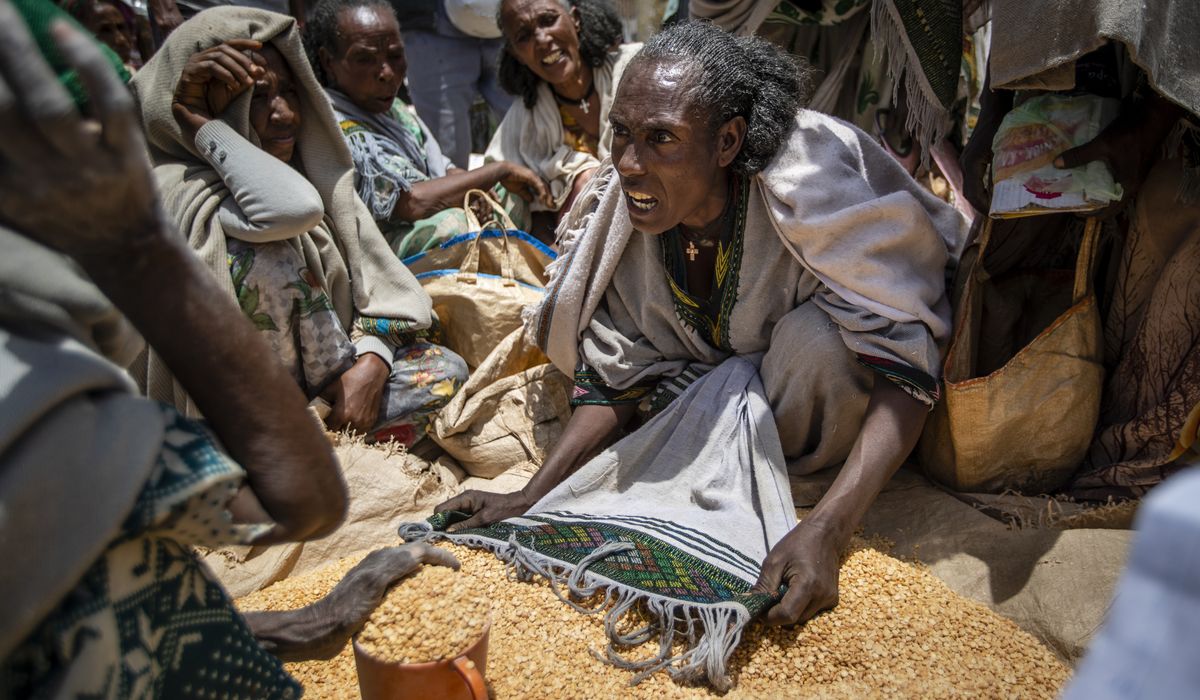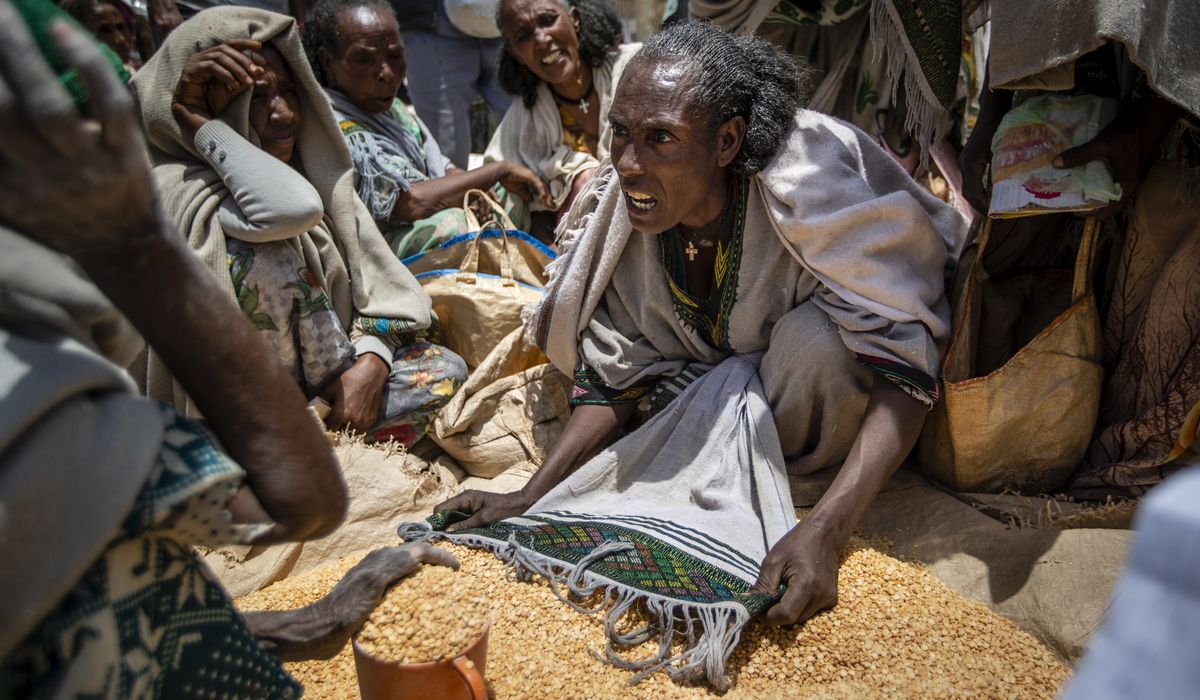
ADDIS ABABA, Ethiopia — It sounded like a breakthrough in what has become Africa’s scariest and most destabilizing war: Rebelling Tigrayan forces this week opened the door to a peace agreement, offering to withdraw from lands outside of their province and begin talks with the government.
Debretsion Gebremichael, who heads the regional Tigray People’s Liberation Front (TPLF) fiercely battling the central government and its allies, sent a letter to United Nations officials this week calling the withdrawal “a decisive opening act for peace.” The rebel leader said he hoped the move would end hostilities and jump-start peace negotiations.
But there are many here — in the capital of Addis Ababa and in Tigray itself — who don’t believe things can return to normal so easily.
In fact, many are pessimistic that Ethiopia‘s diverse tribes can ever live in harmony, especially after the brutality of this conflict which has killed thousands, displaced millions, produced severe food shortages and led the U.N. to pledge to investigate crimes against humanity committed by both sides.
Some say the divisions between the Tigrayan leaders — who had until recently grown accustomed to being the clear first among equals in the country’s tribal power ranking — and the government of Prime Minister Abiy Ahmed, an Oromo whose early reform and security moves after taking power in 2018 won him a Nobel Peace Prize, are too deep to heal quickly.
“The government does not want to see any Tigrayans,” said Kehase Aregawi, 35, who is a Tigrayan, the ethnic group based in northern Ethiopia.
“They want to finish us,” he added, while serving tea and freshly cooked rice to his customers at his hotel in this sprawling capital. “We are dying. There might be no Tigrayans remaining if the conflict continues the way it is.”
Last November, fighting broke out in this Horn of Africa country between government troops and Tigrayan forces after Mr. Abiy launched a military offensive against the region: He blamed the TPLF for staging an attack on a military camp in the region.
And there were deeper strains: Tigray has long resisted the federal government’s power, even holding regional elections in August 2020 after the government had postponed them because of the COVID-19 pandemic.
After eight months of intense fighting, Mr. Abiy‘s government declared a unilateral cease-fire and pulled forces from Mekelle, the capital city of the Tigray region. Tigray forces advanced and captured several towns, including Dessie and Kombolcha near Addis Ababa, raising fears that the rebel forces may soon move on the capital itself.
But Mr. Abiy, a former lieutenant colonel in the military, then rallied government forces, announcing recently that his troops had recaptured Dessie and Kombolcha. Despite the Nobel Peace Prize on his resume, the prime minister appears committed to a harsh policy to teach his adversaries a lesson on the battlefield.
“The struggle isn’t yet finished,” Mr. Abiy said. “We should offer a long-lasting solution to make sure the enemy that has tested us doesn’t become a danger to Ethiopia again.”
His supporters say they won’t rest until the rebels are defeated and Tigrayans are broken of the illusion that they should by right control the country’s key levers of power.
“Tigrayans have not accepted that anyone else can lead this country,” said Muktar Mohammed, a resident of Addis Ababa, who is also an Abiy supporter. “They are angry, and they want to retake power through the back door. They killed everyone and destroyed our country’s economy when they were in power.”
“We will not allow them to ascend to power,” he added “We will defeat them. They are our enemy number one.”
Deep-seated hostility
Analysts say such deep-seated sentiments on both sides could lead to a protracted civil war, threatening the future of Ethiopia, in spite of a cease-fire.
Thousands of civilians have already been killed in 13 months of fighting, and international aid groups estimate that about 400,000 Tigrayan residents face famine conditions and more than twice that number need food and other aid across the country’s north.
And if Africa’s second-most populous country is consumed by war, the instability is likely to be felt far beyond Ethiopia’s landlocked borders. A new U.N. estimate out Thursday projected that an estimated 22 million Ethiopians will require humanitarian assistance in the coming year.
“Ethiopia could be destabilized,” said Macharia Munene, history and international relations professor at the United States International University-Africa in Nairobi. “The residents of Ethiopia are suffering a lot, and it’s going to be chaotic in [the] future if the war continues. The nation is underdeveloped, and people are facing hunger and starvation.”
“In the worst-case scenario, the rebel forces capture Addis Ababa — then there would be no country,” he added.
Fears have been escalating over the conflict destabilizing the region, especially as hundreds of thousands of refugees have crossed borders into unstable Sudan and also Kenya. Eritrea has already been drawn in, helping the government militarily against the TPLF.
Mr. Munene said Sudan, with its recent military coup, fragile transition to democracy and economic crisis, is in no position to handle the influx. He worries about larger numbers leaving Ethiopia.
Meanwhile, analysts are split over a solution to the conflict. Mr. Munene believes a national dialogue is the path forward, saying that Mr. Abiy needs to reach out to rebel forces and allow for frank talks on how to address the causes.
“Military action cannot solve the Ethiopian crisis because the strategy has failed before,” he said, urging the U.N. and other key partners to put pressure on Ethiopia for a cease-fire to allow for negotiations. “Abiy‘s bid to use the military to centralize power in Addis Ababa and destroy the country’s multiethnic federation has failed and is proving disastrous for the country.”
However, Adan Getachew, a security analyst in Addis Ababa, disagreed. For a peaceful solution to be achieved, he said, rebel forces will have to be defeated by the government to save the country from collapsing.
“It’s a risky situation because there must be a winner in this war,” he said, adding that the rebels’ intention is to return to power by any means necessary.
“Dialogue cannot work in this situation because everyone needs power,” he added. “It’s either the government troops who win the war and save the country or lose it to rebel forces, and we become like Somalia and Afghanistan.”
Tigray’s Mr. Debretsion has asked the U.N. diplomats to “establish a mechanism to ensure the immediate and verifiable cessation of all forms of hostilities” and “the total withdrawal of all external forces” from Tigray, as well as the creation of a no-fly zone over the region excluding humanitarian and civilian aircraft. He has also requested an arms embargo on Ethiopia and Eritrea.
The Abiy government was dismissive of the rebels’ letter.
“I don’t even know if such an illegitimate entity can send such a letter to a United Nations body,” government spokeswoman Billene Seyoum told a news conference Tuesday in Addis Ababa, according to the Reuters news agency. The Ethiopian government considers the TPLF a terrorist organization.
Redwan Hussein, State Minister for Foreign Affairs, said in a social media post that the government is not seeking an all-out war reaching into every hamlet and village in the Tigray region, but added “it will make sure that the TPLF will not be able to wage an attack anymore.”
The International Crisis Group, a think tank, in a statement on the conflict Thursday, said Mr. Abiy will be under pressure from non-Tigrayan regions, especially Amhara, to keep up the military campaign but that both sides in the civil war should rush to seize the chance for a deal
“Ethiopia has paid a catastrophic price in the course of this hard-fought war. Moreover, there may still be further battlefield twists,” the ICG statement warned.
“Tigray’s forces command enormous support at home and will seek to resurge unless negotiations get under way. Peace talks could help set Ethiopia on the path to reconstruction and avoid a metastasizing conflict that would further destabilize the Horn of Africa’s key state.”
Meanwhile, both Tigrayans and non-Tigrayans say the conflict has only exacerbated ethnic tensions on the ground, especially in Addis Ababa, where both sides had lived peacefully for years.
“This is no longer our country — all Tigrayans have been labeled as terrorists,” said Bisrat Kibret, a Tigrayan woman and mother of two living in Addis Ababa. “The police and army are raiding homes, community places, and workplaces looking for Tigrayans. Many have been killed, tortured and detained for falsely being accused of supporting rebel forces.”
Mr. Aregawi says the international community must intervene.
“Our country needs help right now,” he said. “We are worried about our country.”








